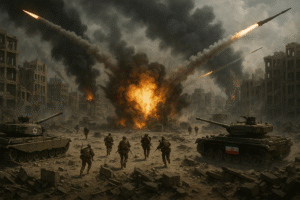China Backs Iran With Plastic Missiles: A New Twist in the Iran-Israel War
Introduction
Tensions in the Middle East have reached a fever pitch as the ongoing conflict between Iran and Israel takes on new dimensions. Recent developments suggest that Iran may be gaining ground in this complex geopolitical struggle, with unexpected support from China, which has reportedly sent plastic missiles to bolster Iran’s military capabilities. This article delves into the current state of affairs, analyzing Iran’s advancements, the implications of China’s involvement, and what this means for the broader regional and global landscape.
Iran’s Strategic Gains
The Shift in Military Engagement
Over the past few years, Iran has significantly modernized its military strategy. This shift is evident in several key areas:
- Proxy Warfare: Iran has effectively leveraged proxy forces throughout the region, particularly in Lebanon and Syria. Organizations like Hezbollah have become instrumental in Iran’s strategy, providing both military and logistical support in asymmetric warfare against Israeli forces.
- Drone Technology: Iran has made remarkable advancements in drone technology. In recent conflicts, Iranian drones have been employed to conduct surveillance and targeted strikes, showcasing their capabilities to disrupt Israeli military operations.
The language must adhere to US English standards.
The Role of Domestic Support
Beyond military might, Iran’s internal dynamics have also shifted in its favor:
- Public Sentiment: There has been a notable rallying of public support for the government amid external threats, fostering a sense of national unity.
- Economic Resilience: Despite international sanctions, Iran has shown a remarkable ability to adapt its economy and maintain essential military funding.
China’s Unexpected Involvement
The plastic Missiles: What Are They?
Recent reports have indicated that China has supplied Iran with plastic missiles, raising eyebrows among military analysts. But what does this mean?
- Cost-Effectiveness: These missiles, despite being categorized as “plastic,” can serve as effective decoys or drones, allowing Iran to confuse enemy radar systems.
- Symbolic Support: This move may symbolize China’s growing partnership with Iran, challenging U.S. influence in the region and showcasing a new axis of power dynamics.
Motivations Behind China’s Support
China’s backing of Iran can be understood through several strategic lenses:
- Economic Ties: China is heavily invested in Iranian oil and gas, and fostering a strong alliance only strengthens these economic interests.
- Geopolitical Strategy: By siding with Iran, China aims to counterbalance U.S. interests in the Middle East, establishing itself as a key player on the global stage.
Implications for Israel and the International Community
Israel’s Response
As Iran gains leverage, Israel is reevaluating its strategies:
- Increased Security Measures: The Israeli Defense Forces (IDF) have been ramping up their military readiness, particularly in northern Israel, anticipating escalated threats from Iranian proxies.
- International Alliances: Israel is likely to seek stronger alliances with nations outside of the U.S., aiming to gather support to counteract Iran’s growing influence.
Global Reactions
The international community is closely monitoring these developments:
- Diplomatic Concerns: Countries that traditionally align with either Iran or Israel will have to navigate a complex situation, balancing their alliances while considering their national interests.
- Potential for Escalation: The weaponization of alliances may lead to misunderstandings that could result in broader conflict—a scenario all players hope to avoid.
“In the world of geopolitics, the stakes are high. Who benefits and who suffers is often a fine line drawn between alliances and rivalries.”
Conclusion
The ongoing conflict between Iran and Israel is evolving, with significant implications for regional stability. Iran’s strategic advancements paired with China’s unexpected support signal a shift in the balance of power not only in the Middle East but globally. As these dynamics unfold, the world watches closely, keenly aware that the consequences will ripple far beyond the borders of Iran and Israel.
As we consider these developments, the question remains: How will the international community respond to a potentially emboldened Iran and an increasingly assertive China? Engaging in dialogue and diplomacy may be the key to mitigating the risks this situation poses to global peace.



Leave a Reply